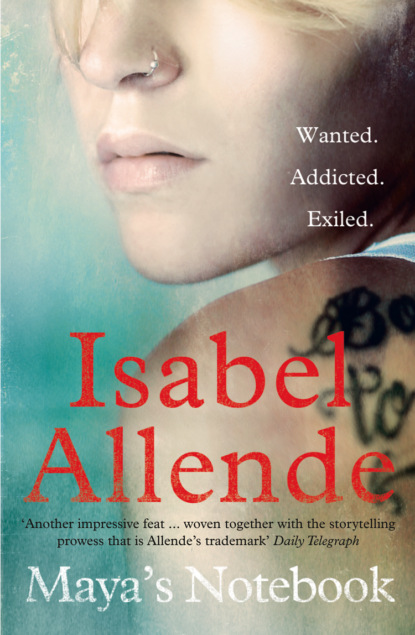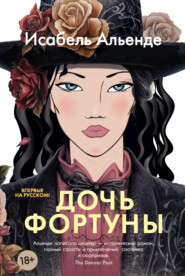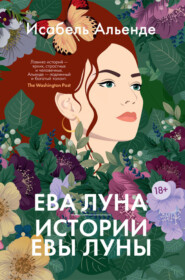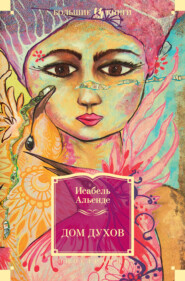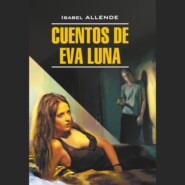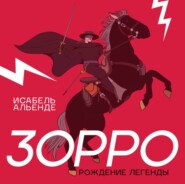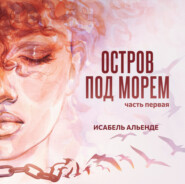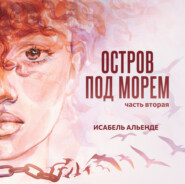По всем вопросам обращайтесь на: info@litportal.ru
(©) 2003-2024.
✖
Maya’s Notebook
Автор
Год написания книги
2018
Настройки чтения
Размер шрифта
Высота строк
Поля
His book on magic in Chiloé has me so hooked it keeps me from sleeping. (Only in a manner of speaking, since the slightest silliness keeps me from sleeping.) I’m not superstitious, like my Nini, but I accept that the world is a mysterious place and anything’s possible. Manuel has a whole chapter on the Mayoría, or the Recta Provincia, as the rule of the much-feared brujos—witches and sorcerers—of these lands was called. On our island the Mirandas are rumored to be a family of brujos, and people cross themselves or keep their fingers crossed when they walk past Rigoberto Miranda’s house. He’s a fisherman by trade, and related to Eduvigis Corrales. His last name is as suspicious as his good luck: fish fight to be caught in his nets, even when the sea is black, and his only cow has given birth to twins twice in three years. They say that Rigoberto Miranda has a macuñ, a bodice made from the skin of the chest of a corpse, for flying at night, but no one’s seen it. It’s advisable to slash dead people’s chests with a knife or a sharp stone so they won’t suffer the indignity of ending up turned into a waistcoat.
Brujos can fly and do all sorts of evil, kill with their minds and turn into animals, none of which I can really see Rigoberto Miranda doing. He’s a shy man who often brings Manuel crabs. But my opinion doesn’t count, I’m an ignorant gringa. Eduvigis warned me that when Rigoberto Miranda comes over, I have to cross my fingers before I let him in the house, in case he casts some spell. Those who’ve never suffered from witchcraft firsthand tend to be skeptical, but as soon as something strange happens they run to the nearest machi, an indigenous healer. Let’s say a family around here starts coughing too much; then the machi will look for a basilisk or cockatrice, an evil reptile hatched from the egg of an old rooster, staying under the house that comes up at night and sucks the air out of the people sleeping there.
The most delectable stories and anecdotes come from the really old people, on the most remote islands of the archipelago, where the same beliefs and customs have held sway for centuries. Manuel gets information not only from the elderly but also from journalists, teachers, booksellers, and shopkeepers, who make fun of brujos and magic but wouldn’t dare venture into a cemetery at night. Blanca Schnake says that her father, when he was young, saw the entrance to the mythical cave where the brujos gathered, in the peaceful village of Quicaví, but in 1960 an earthquake shifted the land and the sea, and since then no one has been able to find it.
The guardians of the cave are invunches, horrifying beings formed by the brujos from firstborn male babies, kidnapped before baptism. The method for transforming the baby into an invunche is as macabre as it is improbable: they break one of his legs, twist it, and stick it under the skin of his back, so he’ll only be able to get around on three limbs and won’t escape; then they apply an ointment that makes him grow a thick hide, like a billy goat’s; they split his tongue like a snake’s and feed him on the rotted flesh of a female corpse and the milk of an Indian woman. In comparison, a zombie can consider itself lucky. I wonder what kind of depraved mind comes up with horrific ideas like that.
Manuel’s theory is that the Recta Provincia had its origins as a political system. Beginning in the eighteenth century, the indigenous people of the region, the Huilliche, rebelled against Spanish rule and later against the Chilean authorities; they supposedly formed a clandestine government copied from the Spanish and Jesuit administrative style, divided the territory into kingdoms, and appointed presidents, scribes, judges, and so on. There were thirteen principal sorcerers, who obeyed the King of the Recta Provincia, the Above Ground King, and the Below Ground King. Since it was indispensable to keep it secret and control the population, the Mayoría created a climate of superstitious fear, and that’s how a political strategy eventually turned into a tradition of magic.
In 1880 several people were arrested on charges of witchcraft, tried in Ancud, and executed. The aim was to break the back of the Mayoría, but nobody is sure whether the objective was achieved.
“Do you believe in witches?” I asked Manuel.
“No, but it’s irrational to rule out the irrational.”
“Tell me! Yes or no?”
“It’s impossible to prove a negative, Maya, but calm down—I’ve lived here for many years, and the only witch I know is Blanca.”
Blanca doesn’t believe in any of this. She told me invunches were invented by the missionaries to convince the families of Chiloé to baptize their children, but that strikes me as going too far, even for Jesuits.
“Who is this Mike O’Kelly? I received an incomprehensible message from him,” Manuel told me.
“Oh, Snow White wrote to you! He’s a good old completely trustworthy Irish friend of the family. It must be my Nini’s idea to communicate with us through him, for safety’s sake. Can I answer him?”
“Not directly, but I can send him a message on your behalf.”
“These precautions are exaggerated, Manuel, what can I say?”
“Your grandmother must have good reason to be so cautious.”
“My grandma and Mike O’Kelly are members of the Club of Criminals, and they’d pay gold to be mixed up in a real crime, but they have to content themselves with playing at bandits.”
“What kind of club is that?” he asked me, looking worried.
I explained it starting from the beginning. The Berkeley county library hired my Nini, eleven years before my birth, to tell stories to children, as a way of keeping them busy after school until their parents finished work. A little while later she proposed to the library the idea of sessions of detective stories for adults, and it was accepted. Then she and Mike O’Kelly founded the Club of Criminals, as it’s called, although the library promotes it as the Noir Novels Club. During the children’s stories hour, I used to be just one of the kids hanging on my grandma’s every word, and sometimes, when she had no one to leave me with, she’d also take me to the library for the adults’ hour. Sitting on a cushion, with her legs crossed like a fakir, my Nini asked the children what they wanted to hear, someone suggested a theme, and she improvised something in less than ten seconds. My Nini has always been annoyed by the contrived need for a happy ending to stories for children; she believes that in life there are no endings, just thresholds, people wandering here and there, stumbling and getting lost. All that rewarding the hero and punishing the villain strikes her as a limitation, but to keep her job she had to stick to the traditional formula; the witch can’t poison the maiden with impunity and marry the prince in a white gown. My Nini prefers an adult audience, because gruesome murders don’t require a happy ending. She’s very well versed in her subject—she’s read every police case and manual of forensic medicine in existence, and claims that she and Mike O’Kelly could carry out an autopsy on the kitchen table with the greatest of ease.
The Club of Criminals consists of a group of lovers of detective novels, inoffensive people who devote their free time to planning monstrous homicides. It began discreetly in the Berkeley library and now, thanks to the Internet, it has global reach. It’s entirely financed by the members, but since they meet in a public building, indignant voices have been raised in the local press, alleging that crime is being encouraged with taxpayers’ money. “I don’t know what they’re complaining about. Isn’t it better to talk about crimes that to commit them?” my Nini argued to the mayor, when he called her to his office to discuss the problem.
My Nini’s friendship with Mike O’Kelly began in a secondhand bookstore, where both were absorbed in the detective fiction section. She had been married to my Popo for a short time, and Mike was a student at the university; he was still walking on two legs and hadn’t given a thought to becoming a social activist or to devoting his life to rescuing young delinquents from the streets and from prison. As long as I can remember, my grandma has baked cookies for O’Kelly’s kids, most of them black or Latino, the poorest people in the San Francisco Bay area. When I was old enough to interpret certain signs, I guessed that the Irishman was in love with my Nini, even though he’s twelve years younger than her, and she would never have even considered being unfaithful to my Popo. It’s a platonic love story straight out of a Victorian novel.
Mike O’Kelly became famous when they made a documentary about his life. He took two bullets in the back for protecting a gangster kid and ended up in a wheelchair, but that didn’t keep him from continuing his mission. He can take a few steps with a walker, and he drives a special car; that’s how he gets around the roughest neighborhoods saving souls, and he’s always the first to show up at any protest that gets going in the streets of Berkeley and the surrounding area. His friendship with my Nini strengthens with every wacky cause they embrace together. They both had the idea that the restaurants of Berkeley should donate leftover food to the city’s homeless, crazies, and drug addicts. She got hold of a trailer to distribute it, and he recruited the volunteers to serve it. On the television news they showed destitute people choosing between sushi, curry, duck with truffles, and vegetarian dishes from the menu. Quite a few of them complained about the quality of the coffee. Soon the lines grew long, filled with middle-class customers ready to eat without paying; there were confrontations between the original clientele and those taking advantage, and O’Kelly had to bring his boys in to sort them out before the police did. Finally the Department of Health prohibited the distribution of leftovers, after someone had an allergic reaction and almost died from the Thai peanut sauce.
The Irishman and my Nini get together often to analyze gruesome murders over tea and scones. “Do you think a chopped-up body could be dissolved in drain cleaner?” would be a typical O’Kelly question. “It would depend on the size of the pieces,” my Nini might say, and the two of them would proceed to prove it by soaking a pound of pork chops in Drano, while I would have to make notes of the results.
“It doesn’t surprise me they’ve conspired to keep me incommunicado at the bottom of the world,” I told Manuel Arias.
“From the sounds of things, they’re scarier than your supposed enemies, Maya,” he answered.
“Don’t underestimate my enemies, Manuel.”
“Did your grandfather soak chops in drain cleaner too?”
“No, he wasn’t into crimes, just stars and music. He was a third-generation jazz and classical music lover.”
I told him how my grandfather taught me to dance as soon as I could stay upright and bought me a piano when I was five, because my Nini expected me to be a child prodigy and compete on television talent shows. My grandparents put up with my thunderous keyboard exercises, until the piano teacher told them my efforts would be better spent on something that didn’t require a good ear. I immediately opted for soccer, as Americans call proper football, an activity that my Nini thinks is silly: eleven grown men in shorts chasing after a ball. My Popo knew nothing of this sport, because it’s not very popular in the United States, and although he was a baseball fanatic, he didn’t hesitate to abandon his own favorite sport in order to sit through hundreds of little girls’ soccer games. Thanks to some colleagues at the São Paulo observatory, he got me an autographed poster of Pelé, who was long-retired and living in Brazil. My Nini spent her efforts on getting me to read and write like an adult, since it was obvious I wasn’t going to be a musical prodigy. She signed me up as a library member, made me copy paragraphs of classic books, and thwacked me on the head if she caught a spelling mistake or if I got a mediocre mark in English or literature, the only subjects that interested her.
“My Nini has always been rough, Manuel, but my Popo was a sweetie, he was the light of my life. When Marta Otter left me at my grandparents’ house, he held me very carefully against his chest, because he’d never had a newborn in his arms before. He said the affection he felt for me left him dazed. That’s what he told me, and I’ve never doubted his love.”
Once I start talking about my Popo, there’s no way to shut me up. I explained to Manuel that I owe my love for books and my rather impressive vocabulary to my Nini, but everything else I owe to my grandpa. My Nini forced me to study, saying “Spare the rod and spoil the child,” or something just as barbarous, but he turned learning into a game. One of those games consisted in opening the dictionary at random, closing your eyes, pointing to a word, and then guessing what it means. We also used to play stupid questions: Why does the rain fall down, Popo? Because if it fell up, your underwear would get wet, Maya. Why is glass transparent? To confuse the flies. Why are your hands black on top and pink underneath, Popo? Because the paint ran out. And we’d go on like that until my grandma ran out of patience and started howling.
My Popo’s immense presence, with his sarcastic sense of humor, his infinite goodness, his innocence, his belly to rock me to sleep, and his tenderness, filled my childhood. He had a booming laugh that bubbled up from the bowels of the earth and shook him from head to toe. “Popo, swear to me that you’ll never ever die,” I used to demand at least once a week, and his reply never varied: “I swear I’ll always be with you.” He tried to come home early from the university to spend some time with me before going up to his desk and his big fat astronomy books and his star charts, preparing his classes, correcting proofs, researching, writing. His students and colleagues would visit and they’d shut themselves up to exchange splendid and improbable ideas until dawn, when my Nini would interrupt in her nightie with a big thermos of coffee. “Your aura’s getting dull, old man. Don’t forget you’ve got to teach at eight,” and she’d proceed to pour out coffee and push the visitors toward the door. The dominant color of my grandfather’s aura was violet, very appropriate, because it’s the color of sensibility, wisdom, intuition, psychic power, and vision of the future. These were the only times my Nini entered his office, whereas I had free access and even my own chair and a corner of the desk to do my homework on, to the rhythm of smooth jazz and the aroma of pipe tobacco.
According to my Popo, the official education system stunts intellectual growth; teachers should be respected, but you don’t need to pay them much attention. He said that Leonardo da Vinci, Galileo, Einstein, and Darwin, just to mention four geniuses of Western culture, since there were lots more, like the Arab philosophers and mathematicians Avicenna and al-Khwarizmi, questioned the knowledge of their era. If they’d accepted the stupidities their elders taught them, they wouldn’t have invented or discovered anything. “Your granddaughter is no Avicenna, and if she doesn’t study she’ll have to earn her living flipping burgers,” my Nini answered back. But I had other plans; I wanted to be a pro soccer player, they earn millions. “They’re men, silly girl. Do you know any women who earn millions?” my grandma asserted and swiftly launched into a lecture on inequality that began in the field of feminism and veered into social justice, to conclude that I’d end up with hairy legs if I kept playing soccer. Later, as an aside, my grandpa would explain that genes and hormones cause hirsutism, not sports.
For the first years of my life I slept with my grandparents, at the beginning in between the two of them and later in a sleeping bag we kept under the bed and the existence of which the three of us pretended to ignore. At night my Popo took me up to the tower to examine the infinite space strewn with lights, and I learned to distinguish between the blue approaching stars and the red ones moving away, the clusters of galaxies and the superclusters, even huger configurations, of which there are millions. He explained that the sun is a small star among the hundred million stars in the Milky Way and there were probably millions of other universes, aside from those we can only glimpse now. “So, in other words, Popo, we are less than the sigh of a louse,” was my logical conclusion. “Doesn’t it seem fantastic, Maya, that these little louse sighs can comprehend the wonder of the universe? An astronomer needs more poetic imagination than common sense, because the magnificent complexity of the universe cannot be measured or explained, but only intuited.” He talked to me about the gases and stellar dust that combine to form beautiful nebulae, true works of art, intricate brushstrokes of magnificent colors in the heavens. He told me how stars are born and die. We talked about black holes, about space and time, about how everything might have originated with the Big Bang, an indescribable explosion, and about the fundamental particles that formed the first protons and neutrons, and thus, in increasingly complex processes, the galaxies, planets, and then life were born. “We come from the stars,” he used to tell me. “That’s exactly what I always say,” my Nini added, thinking of horoscopes.
After visiting the tower with its magical telescope and giving me my glass of milk with cinnamon and honey, an astronomer’s secret to help develop intuition, my grandpa made sure I brushed my teeth and then put me to bed. Then my Nini would come and tell me a different story every night, invented as she went along, stories I always tried to make last as long as possible, but the moment inevitably arrived when I’d be left alone, then I’d start counting sheep, alert to the swaying of the winged dragon above my head, the creaking of the floor, the footsteps and discreet murmurs of the invisible inhabitants of that haunted house. My struggle to overcome my fear was mere rhetoric, because as soon as my grandparents fell asleep, I’d slip into their room, feeling my way through the darkness, drag the sleeping bag into a corner, and lie down in peace. For years my grandparents went to hotels at indecent hours to make love secretly. Only now that I’m grown up do I realize the extent of the sacrifice they made for me.
Manuel and I analyzed the cryptic message O’Kelly had sent. It was good news: the situation at home was normal, and my persecutors hadn’t shown any signs of life, although that didn’t mean they’d forgotten about me. The Irishman didn’t say that in so many words, as is logical, given the situation, but in a code similar to that used by the Japanese during World War II, which he’d taught me.
I’ve been on this island for a month now. I don’t know if I’ll ever get used to the snail’s pace of life on Chiloé, to this idleness, this permanent threat of rain, this immutable landscape of water and clouds and green pastures. Everything’s the same, everything’s calm. Chilotes have no concept of punctuality; plans depend on the weather and people’s moods, things happen when they happen, why do today what can be done tomorrow? Manuel Arias makes fun of my lists and projects, futile in this timeless culture; an hour can last as long as a week here. He still keeps regular working hours, though, and progresses with his book at the pace he’s set for himself.
Chiloé has its own voice. I never used to take my headphones off my ears—music was my oxygen—but now I walk around attentive to the twisted Spanish they speak here. Juanito Corrales left my iPod in the same pocket of my backpack he took it from, and we’ve never mentioned the matter, but during the week it took him to return it, I realized that I didn’t miss it as much as I thought I would. Without my iPod I can hear the island’s voice: birds, wind, rain, crackling wood fires, cart wheels, and sometimes the distant fiddles of the Caleuche, a ghost ship that sails in the fog and is recognized by the music and the rattling bones of its shipwrecked crew, singing and dancing on the deck. The ship is accompanied by a dolphin called Cahuilla, the name Manuel gave his boat.
Sometimes I wish I could have a shot of vodka for old times’ sake; though the old times were awful, they were at least a bit more exciting than these. It’s just a fleeting whim, not the panic of enforced abstinence I’ve experienced before. I’m determined to fulfill my promise—no alcohol, drugs, telephone, or e-mail—and the truth is, it’s been easier than I expected. Once we cleared up that point, Manuel stopped hiding the bottles of wine. I explained that he shouldn’t have to change his habits for my sake—there’s alcohol everywhere, and I’m the only one responsible for my own sobriety. He understood, and now he doesn’t get so worried if I go into the Tavern of the Dead to see some TV program or watch them play truco, an Argentinean card game, played using a Spanish deck, in which the participants improvise lines of verse in rhyme along with every bid.
I love some of the island’s customs, like truco, but there are others that bug me. If a chucao, a tiny little loudmouthed bird, chirps to the left of me, it’s bad luck, so I should take off a piece of clothing and put it back on inside out before going any farther; if I’m walking at night, I’m supposed to carry a clean knife and salt, because if I cross paths with a black dog with one ear lopped off, that’s a brujo, and in order to get away I have to trace a cross in the air with the knife and scatter salt. The diarrhea that almost did me in when I first arrived in Chiloé wasn’t dysentery, because that would have gone away with the doctor’s antibiotics, but a curse, as Eduvigis demonstrated by curing me with prayer, her infusion of myrtle, linseed, and lemon balm, and her belly rubs with silver polish.
Chiloé’s traditional dish is curanto, and our island’s is the best. The idea of offering curanto to tourists was one of Manuel’s initiatives to break the isolation of this little village, where visitors rarely venture, because the Jesuits didn’t leave one of their churches here, and we don’t have any penguins or whales, only swans, flamingos, and toninas, the white-bellied dolphins that are so common around here. First Manuel spread the rumor that La Pincoya’s cave was here, and nobody had the authority to refute it; the exact site of the grotto is up for discussion, and several islands claim it. The grotto and curanto are now our tourist attractions.
The northeast shore of the island is wild and rocky, dangerous for boats, but excellent for fishing. A submerged cavern over there, only visible at low tide, is perfect for the kingdom of La Pincoya, one of the few benevolent beings in the frightening mythology of Chiloé, because she helps fishermen and sailors in trouble. She’s a beautiful young woman with long hair draped in kelp, and if she dances facing the sea, the fishing will be abundant, but if she faces the beach as she dances, there will be scarcity and the fishermen must look for another place to cast their nets. But since almost nobody’s ever seen her, this information is useless. If La Pincoya appears, you have to close your eyes and run in the opposite direction, because she seduces the lustful and takes them to the bottom of the sea.
It’s just a twenty-minute walk along a steep uphill path from the village to the grotto, as long as you’re in decent shoes and good spirits. On the top of the hill are a few solitary monkey-puzzle trees dominating the landscape, and from up there you can appreciate the bucolic panorama of the sea, sky, and nearby uninhabited small islands. Some of these are separated by such narrow channels that at low tide you can shout from one shore to the other. From the hilltop the grotto looks like a big toothless mouth. You can scramble down the seagull-shit-covered rocks, at the risk of breaking your neck, or you can get there by kayak, skirting along the coast of the island, as long as you know the waters and the rocks. You need a bit of imagination to appreciate La Pincoya’s underwater palace, because beyond the witch’s mouth of the cave, you can’t see anything. In the past some German tourists tried to swim inside, but the carabineros have banned it because of the treacherous currents. It would be very inconvenient for us if foreigners started drowning here.
I’ve been told that January and February are dry, hot months in these latitudes, but this must be an odd summer, because it rains all the time. The days are long, and the sun’s still in no hurry to set.
I go swimming in the sea in spite of Eduvigis’s warnings about the undertows, the carnivorous salmon escaped from the cages, and the Millalobo, a mythological being, half man and half seal, with a golden pelt, who could abduct me at high tide. To that list of calamities Manuel added hypothermia; he says only a gullible gringa would think of swimming in these freezing waters without a wetsuit. I haven’t actually seen anybody go into the water by choice. Cold water is good for you, my Nini always used to insist when the water heater broke down in the big house in Berkeley—that is, two or three times a week. Last year I abused my body so much, I could have died out in the street; I’m here to recover, and there’s nothing better for that than a swim in the sea. I just hope my cystitis doesn’t come back, but so far so good.
I’ve been to some other islands and towns with Manuel to interview the really old people, and I have a general idea of the archipelago now, although I haven’t been to the south yet. Castro is the heart of the Isla Grande, with more than forty thousand people and a buoyant economy. Buoyant is a slight exaggeration, but after six weeks here, Castro is like New York. The city pokes out of the sea, with wooden houses on stilts all along the shore, painted bright colors to cheer people up during the long winters, when the sky and the water turn gray. There Manuel has his bank account, dentist, and barber; he does his grocery shopping there, orders books and picks them up at the bookstore.
If the sea is choppy and we can’t make it back home, we stay in a guesthouse run by an Austrian lady, whose formidable backside and big round chest make Manuel blush, and stuff ourselves with pork and apple strudel. There aren’t many Austrians around here, but lots of Germans. The immigration policies of this country have been very racist—no Asians, blacks, or indigenous people from elsewhere, only white Europeans. A nineteenth-century president brought Germans from the Black Forest and gave them land in the south—land that wasn’t his to give, but belonged to the Mapuche Indians—with the idea of improving the gene pool; he wanted the Germans to impart punctuality, a love of hard work, and discipline to Chileans. I don’t know if the plan worked the way he’d hoped, but in any case Germans raised up some of the southern provinces with their efforts and populated them with their blue-eyed spawn. Blanca Schnake’s family is descended from those immigrants.
We made a special trip so Manuel could introduce me to Father Luciano Lyon, an amazing old man who was in prison several times during the military dictatorship (1973–89) for defending the persecuted. The Vatican, fed up with slapping the wrists of the rebellious priest, ordered him to retire to a remote country house in Chiloé, but the old combatant wasn’t short of causes to make him indignant here either. When he turned eighty, his admirers from all the islands got together, and twenty buses filled with his parishioners arrived from Santiago. The party lasted for two days on the esplanade in front of the church, with roast lambs and chickens, empanadas, and a river of cheap wine. They had another miracle of the loaves and the fishes, because people kept arriving, and there was always more than enough food. The drunks from Santiago spent the night in the cemetery, paying no attention to the souls in torment.
The priest’s little house was guarded by a majestic rooster with iridescent plumage crowing on the roof and an imposing unshorn ram lying across the threshold as if it were dead. We had to go in through the kitchen door. The ram, appropriately named Methuselah, having escaped the stewpot for so many years, was so old he could barely move.
“What are you doing down this way, so far from your home, girl?” was Father Lyon’s greeting.





